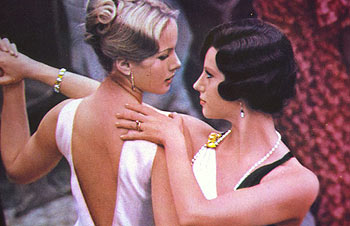Movies |
The Conformist
directed by Bernardo Bertolucci
By
Published: Jul 11, 2022
Category:
Drama
Timothy Snyder’s first commandment in On Tyranny: “Do not obey in advance.” What happens if you do? “The Conformist” is that story.
In his 77 years, Bernardo Bertolucci made several unforgettable films. “Last Tango in Paris,” of course, because of that thing Marlon Brando did to Maria Schneider with butter as an unlikely lubricant. “The Last Emperor” was more remarkable; nominated for nine Academy Awards, it won all nine. My favorite is “The Conformist.” Beauty, danger, cruelty, sex, dancing, politics, murder — they’re all here. I could say it’s oddly topical now, but that would be to cheapen it; a masterpiece is always relevant.
The question the movie asks: What kind of man gets himself in such a pickle that — on his honeymoon — he’s given a gun and asked to kill a professor he’s always admired?
That’s the question presented at the beginning of "The Conformist," as Marcello Clerici (Jean-Louis Trintignant) sits in a Paris hotel room, waiting for the call that will tell him it’s time to kill the professor. If you love movies, the answer — told in a series of flashbacks, and, on occasion, flashbacks within flashbacks — will make for one of the most rewarding cinematic experiences of your life.
Bertolucci made "The Conformist" at 29. It is a young man’s film, drenched in ambition. Many agree it’s his greatest film. [To stream the video on Amazon Prime, click here.]
Here’s the preview.[Worry not: the movie has subtitles.]
The cinematographer was Vittorio Storaro, and his color palette is so exquisite that Francis Ford Coppola watched this film over and over before making "The Godfather" — and then hired Storaro to shoot "Apocalypse Now." The production designer was Ferdinando Scarfiotti, whose credits include "Death in Venice" and "Scarface." And Georges Delerue, who did the scores for "Jules and Jim" and “Platoon," composed the music.
Trintignant is one of the most familiar faces in French cinema; this is the performance of his life. But mostly, I want to praise Dominique Sanda, then just 22 years old and making only her third movie. She plays the professor’s wife, and she unfailingly strikes a remarkable balance — on one hand, she’s the loyal spouse, on another, she’s a bi-sexual flirt, and on yet a third, she’s the only character in the story who senses the tragedy that lies ahead.
The story is adapted from the novel by Alberto Moravia, one of Italy’s most seductive novelists. Sex is almost a character for Moravia, and it certainly is here — as the title suggests, Clerici’s greatest desire is to be normal, to be one of the faceless masses, to conform.
That’s not so easily done in Italy in 1936. Mussolini has brought down the Fascist boot; progressives have fled the country. So Clerici takes a rich, vapid wife. He makes his accommodation with the government. And with that — he thinks — he’s safe.
But there are no hiding places in life — and certainly not in a dictatorship of madmen. And then there is the question of the past: How do you acquire a "normal" life if you never had one before? As we flash back, we see that Clerici’s privileged childhood was anything but normal. His mother awoke at noon, looking for her first shot of the day. He was raised by nannies. And then there was the encounter with the chauffeur…
What Bertolucci is exploring here is the equation of politics with sex. In a film financed by an American studio, that equation would be explicit and vulgar. Here, every connection is made through imagery and suggestion. Your jaw will drop at scene after scene, but you’ll be on the edge of your seat during one in particular — an evening at a Parisian dance hall when Sanda dances with Clerici’s wife. It’s a breathtaking seduction, hotter in some ways than sex itself.
Why does Clerici freeze when he’s given a gun? Can he kill the professor? What happens to Sanda? And, jumping ahead, what does the Fascist’s defeat mean for Clerici? Bertolucci’s screenplay is brilliant on these key questions; you are always leaning in, thinking it through, putting the puzzle together. And, of course, you are invited to imagine — as we always do in great films — how would I handle this? What would I do if I were Clerici?
If you come to love "The Conformist", consider also The Garden of the Finzi-Continis, also starring Dominique Sanda, made a year later and exploring some of the same themes. Or you could read Alberto Moravia’s novel. But be warned: This is that rare case — a movie so much better than the book that reading it is a disappointment.
—-
BONUS VIDEO


